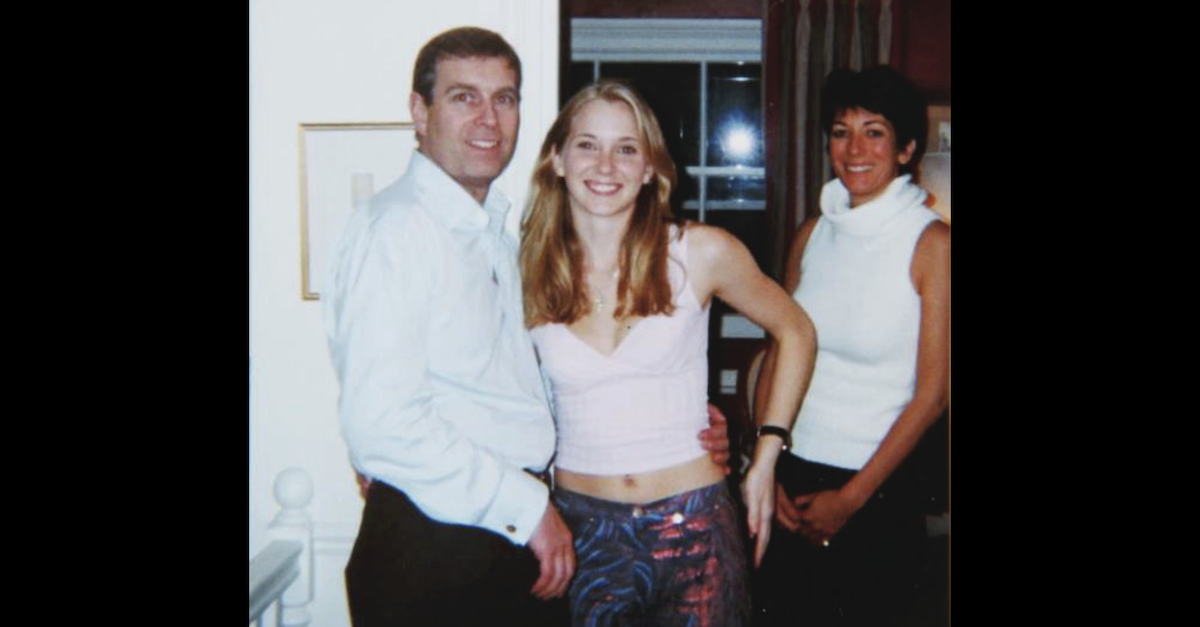
The government entered this photograph of Jeffrey Epstein standing in front of his Gulfstream airplane into evidence during his ex-pilot’s testimony during the trial of Ghislaine Maxwell. (Photo via DOJ)
A once-confidential 2009 settlement agreement signed by Jeffrey Epstein that has figured prominently in the lawsuit against Prince Andrew became public on Monday, one day before a long-anticipated court hearing involving the royal.
The $500,000 settlement deal contains a provision purporting to insulate “Other Potential Defendants” from Epstein-related liability.
Prince Andrew has invoked this provision in attempting to fend off a lawsuit by Virginia Giuffre (née Roberts), who accused him of sexually abusing her when she was 17 years old.
The extraordinarily broad provision stipulates that Giuffre “remise, release, acquit, satisfy, and forever discharge the said Second Parties and any other person or entity who could have been included as a potential defendant (‘Other Potential Defendants’) from all, and all manner of, action and actions” that she may bring, whether “state or federal.”
The prince’s lawyer Andrew B. Brettler previously claimed that the agreement specifically exempted “royalty.”
“Because Prince Andrew is a senior member of the British royal family, he falls into one of the expressly identified categories of persons, i.e., royalty, released from liability under the Release Agreement, along with politicians, academicians, businessmen, and others allegedly associated with Epstein,” Brettler wrote in a memo on Oct. 29.
The word “royalty” does not appear in the specific document released on Monday, and on this point, the prince’s defense briefing appears to refer to the language of Giuffre’s underlying lawsuit.
Giuffre claims that Prince Andrew sexually assaulted her in three locations: Epstein’s New York mansion and private island in the U.S. Virgin Islands and the London home of now-convicted sex trafficker Ghislaine Maxwell.
The latter location is where the prince was pictured with his arm around Giuffre’s waist, with Maxwell standing in the background. Andrew denies the allegations.

Prince Andrew stands with his arm around Virginia Giuffre’s waist, with Ghislaine Maxwell standing in the background. Giuffre included this photograph in her lawsuit against the British royal. (Photo via Giuffre’s lawsuit)
Also on Monday, U.S. District Judge Alison Nathan—who presided over Maxwell’s case—asked prosecutors and defense attorneys to set a schedule for sentencing and plans for the two remaining perjury counts. Before her trial, Maxwell succeeded in severing two of the eight charges of her indictment accusing her of lying in depositions during her lawsuit with Giuffre. The jury only heard the other six counts during her first trial, broadly breaking down into grooming minors for Epstein’s abuse and sex trafficking. Maxwell was convicted of five counts.
A little more than an hour before Maxwell’s guilty verdict, two federal judges ordered the release of the Epstein agreement: U.S. District Judge Lewis Kaplan, who is presiding over Giuffre’s lawsuit with Andrew, and Senior U.S. District Judge Loretta Preska, who is presiding over sprawling litigation between Giuffre and Professor Emeritus at Harvard Law School Alan Dershowitz. After Giuffre accused Dershowitz of sexual battery, Dershowitz, who has called Giuffre a liar he’s never met, countersued for defamation. He also argued the 2009 Epstein deal shielded him under a provision protecting “academicians” associated with Epstein.
Prince Andrew’s attorney wrote that Dershowitz’s invocation of the agreement succeeded in his case.
“Indeed, that same agreement was the basis for Giuffre agreeing to dismiss her previously released battery claim against Professor Dershowitz earlier this year,” Brettler’s memo states. “Professor Dershowitz, as a third-party beneficiary of the 2009 settlement agreement, was entitled to rely upon and enforce the terms of that secret deal.”
On Tuesday of this week, Andrew and Giuffre’s legal teams will face off in federal court for arguments on the royal’s motion to dismiss the case. The 2009 settlement will be only one of the topics at issue during the hearing. Prince Andrew has argued that the case does not belong in the Southern District of New York, claiming that Giuffre exaggerated her ties to the United States and actually resides in Perth, Australia. The royal’s attorneys also argue that Giuffre was above the age of consent in New York and attack the constitutionality of the state’s Child Victims Act, which temporarily lifted the statute of limitations on cases involving allegations of sexual abuse against minors. The statute expired shortly after Giuffre filed her lawsuit.
If Giuffre’s lawyers can surmount the prince’s varying procedural objections, they have planned a multifaceted legal offensive. The attorneys hope to undermine Prince Andrew’s interview with BBC Newsnight, widely perceived to be disastrous for the royal.
In response to Giuffre’s description of Andrew as profusely sweating in a nightclub, the prince offered a memorable denial: “I have a peculiar medical condition,” the prince told the network, claiming he lost the ability to sweat because of an “overdose of adrenaline in the Falklands War.”
Giuffre’s attorney David Boies said in court papers that he wants to probe that claim.
“If Prince Andrew truly has no documents concerning his communications with Maxwell or Epstein, his travel to Florida, New York, or various locations in London, his alleged medical inability to sweat, or anything that would support the alibis he gave during his BBC interview, then continuing with discovery will not be burdensome to him at all,” Boies wrote.
In a statement to Law&Crime, Boies reiterated the position that the release is “irrelevant” to Giuffre’s lawsuit.
“The release does not mention Prince Andrew,” Boies wrote. “He did not even know about it. He could not have been a ‘potential defendant’ in the settled case against Jeffrey Epstein both because he was not subject to jurisdiction in Florida and because the Florida case involved federal claims to which he was not a part.”
Before Maxwell’s criminal case, her legal team argued that she was insulated by a different agreement: the 2008 sweetheart plea deal between Epstein and federal prosecutors in Florida, purporting to insulate his accused co-conspirators.
The U.S. Attorney’s office in Southern District of New York argued that the actions of Florida prosecutors could not bind them. Judge Nathan ultimately agreed, dismissing Maxwell’s challenging and reading the case for trial.
Boies argued that the same is true for Giuffre’s civil settlement, signed in the Southern District of Florida when his client was known only as “Jane Doe No. 102.” The settlement agreement contains a clause shielding the plaintiff’s anonymity, which is no longer relevant, as Giuffre has since gone public in court and to the press.
“The actual parties to the release have made clear that Prince Andrew was not covered by it,” Boies continued in a statement. “Lastly, the reason we sought to have the release made public was to refute the claims being made about it by Prince Andrew’s PR campaign.”
Attorney Mitchell Epner, a former federal prosecutor who led intake on sex-trafficking cases in the District of New Jersey in 2003 and 2004, marveled at the breadth of the agreement.
“This is an extraordinarily broad release that, on its face, releases any claims that Ms. Giuffre Roberts has against anyone that she might have been able to sue as a result of sexual abuse by Epstein,” noted Epner, who is now of counsel with the firm Rottenberg Lipman Rich PC. “It releases all claims she ‘ever had or now ha[s] for, upon, or by reason of any matter … (whether known or unknown) from the beginning of the world to the day of this release.’”
“So, if Prince Andrew had run Virginia Giuffre Roberts over in a hit-and-run, that would be released too,” Epner added.
Prince Andrew’s attorney did not immediately respond to Law&Crime’s emails requesting comment.
Read the agreement, below:
(Photo of Epstein via DOJ)